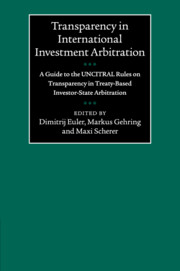 Transparency in International Investment Arbitration
Transparency in International Investment Arbitration Book contents
- Frontmatter
- Contents
- Contents
- List of contributors
- Foreword
- Acknowledgements
- Table of treaties, guidelines and rules
- Table of cases
- List of abbreviations
- 1 Introduction
- 2 Public interest in investment arbitration
- 3 Article 1. Scope of application
- 4 Article 2. Publication of information at the commencement of arbitral proceedings
- 5 Article 3. Publication of documents
- 6 Article 4. Submission by a third person
- 7 Article 5. Submission by a non-disputing Party to the treaty
- 8 Article 6. Hearings
- 9 Article 7. Exceptions to transparency
- 10 Article 8. Repository of published information
- 11 The application of transparency
- 12 Conclusion: The Rules as a swing of the pendulum?
- Index
6 - Article 4. Submission by a third person
Published online by Cambridge University Press: 05 August 2015
- Frontmatter
- Contents
- Contents
- List of contributors
- Foreword
- Acknowledgements
- Table of treaties, guidelines and rules
- Table of cases
- List of abbreviations
- 1 Introduction
- 2 Public interest in investment arbitration
- 3 Article 1. Scope of application
- 4 Article 2. Publication of information at the commencement of arbitral proceedings
- 5 Article 3. Publication of documents
- 6 Article 4. Submission by a third person
- 7 Article 5. Submission by a non-disputing Party to the treaty
- 8 Article 6. Hearings
- 9 Article 7. Exceptions to transparency
- 10 Article 8. Repository of published information
- 11 The application of transparency
- 12 Conclusion: The Rules as a swing of the pendulum?
- Index
Summary
6.1 Introduction
1. No modern rules of investor-State arbitration procedure would be complete without the possibility of allowing submissions by third persons. Indeed, it is the concerns surrounding the (lack of) transparency in investment arbitration that prompted the development by UNCITRAL, through UNCITRAL Working Group II (Arbitration and Conciliation) (WG), of the Rules. Central to making investor-State arbitral proceedings more transparent is the role of amici curiae, or ‘friends of the court’.
2. The concept of amicus curiae allows third party participation by means of offering assistance to the court under certain circumstances. The underlying rationale for allowing such submissions is to provide the decision-making body with additional information falling outside its expertise or which would otherwise not have been adequately considered.
3. Amicus briefs as a legal instrument for non-disputing party intervention are frequently found in common law jurisdictions. The concept was presumably first employed by common law courts as a means of compensating for the adversarial procedures that did not allow independent fact-gathering by the court. Civil law jurisdictions with inquisitorial court structures and more extensive options for third party intervention generally have traditionally been more reluctant to allow amici curiae. Depending on which procedural ‘style’ is followed in investor-State disputes, these historical motives can still be relevant.
4. Before international panels, amicus briefs have developed to become widely accepted and used instruments. Over the past decade, tribunals constituted under the North American Free Trade Agreement (NAFTA), bilateral investment treaties (BITs) and Free Trade Agreements (FTAs) have received numerous requests from non-governmental organisations (NGOs), industry bodies, other groups, and individuals seeking participation in investor-State arbitral proceedings. The content of such requests has differed, but generally petitioners have sought leave to file written submissions, access case documents, and both passively and actively participate in oral hearings. Third person participation is a concept largely confined to disputes involving matters of a greater public interest, which frequently arise in the context of investor-State arbitral proceedings on the basis of the types of projects that are covered by BIT and other treaty protections, because third persons often represent such public interests.
- Type
- Chapter
- Information
- Transparency in International Investment ArbitrationA Guide to the UNCITRAL Rules on Transparency in Treaty-Based Investor-State Arbitration, pp. 128 - 195Publisher: Cambridge University PressPrint publication year: 2015
- 1
- Cited by


